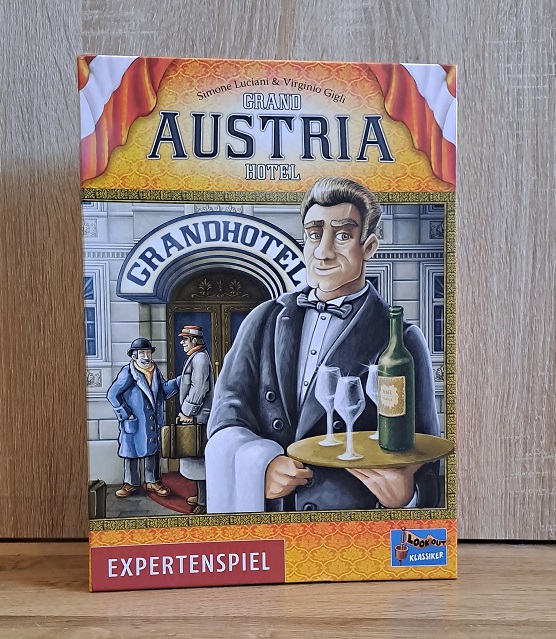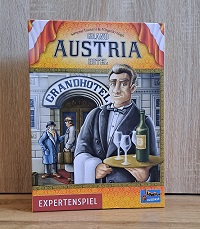Grand Austria Hotel is one of the top dice-placement board games and it also happens to be one of my personal favorites. Let’s see what 3 Key Factors Behind Grand Austria Hotel Board Game Brilliance.
Unique theme
At the turn of the 20th Century, Vienna was a bustling metropolis of a large multi-national empire. Aristocrats, traders, artists, intellectuals, businessmen, and peasants from all corners of the empire all had errands of their own in the capital.
But they had one thing in common – they needed a place to stay. And the hotel they stay in has to be managed – by you. Not only is this a unique setting in the board gaming world, but the vibes of the theme are felt and the mechanics are intertwined with the theme, making actions logical and intuitive.
Although fulfilling the orders from your guests is a simple contract-fulfillment mechanic, it feels more personal than just that. Thematic food and beverages (wine, coffee, cake, and strudel) go a long way in helping with that.
Staff cards are another thematic layer that makes sense. The Waiter, of course, helps you with serving the meals, and so on. Then there’s the Emperor track, which (although it’s the most abstract of all the systems in the game) can be understood as on what terms you are with the Emperor and the government.
But probably the most thematically intuitive element is the basic concept of the game. The more rooms you fill, the better your hotel will do. So in order to do that, you need to prepare a room, then accommodate a guest, whose tummy has been catered to in the restaurant.
Kind of similar to Ark Nova, only that in that one you prepare pens and settle them with animals to build the zoo of your dreams.

Ideal Luck/Skill Factor
Grand Austria Hotel is one of those board games that strike just the right balance between luck and open information. There’s the setup, consisting of your hotel, objectives, staff cards, and Emperor track awards/penalties. You can forge a general strategy for your play just from those.
But your strategy will inevitably come to a test when it meets the stuff out of your control. What color guests are on offer and what abilities do they come with? And most importantly, what do the dice say?
The action strength mechanism with dice is one of the standout mechanics in Grand Austria Hotel. The more dice of a certain number are on offer, the stronger that action will be. So you’ll often have to adapt and do an action dictated by dice, not by your desires. Albeit only for taking them away from other players.
The dice placement is perfected with the snake selection order, which helps to even the playing field, and the pass option. This allows you to re-roll the leftover dice and choose your action(s) after everyone else. Often, this will be the only choice in the field of unfavorable options.
The gameplay is tight but with great combo potential
Although the game is quite tight on resources and restrictive on what you can (or rather, should) do in a given moment, the interconnected mechanisms between resource management, rooms, guests, objectives, staff, and dice offer great potential for combos.
And this is where the main joy of the game comes from – putting all the above factors together. Finding synergies and opportunities between the cards, dice, and your overall strategy, determined by objectives and your hotel plan.
If the factors align, you’ll be able to perform powerful, almost game-breaking turns. Accommodate several guests per turn, complete multiple groups of rooms, and so on. Finding these “hidden” combo moves is satisfying in any board game, but Grand Austria Hotel particularly shines in this aspect.
Some downsides
Although Grand Austria Hotel is a formidable board game, it’s not without flaws. It’s only fair to mention those as well.
The game is best for two players. The higher the player count, the more downtime it is. This is particularly noticeable because of the “snake” turn order, which means you’ll sometimes take two turns in a row, and other times it may take two rotations before it’s your turn again. Moreover, there’s very little player interaction (other than competing for objectives, dice, and guests), so the gameplay doesn’t really gain anything if you play it with more players.
Hand in hand with the downtime, analysis paralysis can also be a concern. There are a lot of factors to consider before making a move and it’s possible to freeze. You only get 14 turns, so every one of them counts big time.
All this makes it harder for a new player to get in, and frankly, the restrictive emperor track combined with the scarce resources might prove too tight for many new players. It’s also harder for them to spot opportunities where you can make up these deficits.
Finally, as with any game that comes with a deck, the staff and guest decks are not ideally balanced. Some staff cards are clearly more potent than others (i.e. yucata.de uses a variant that bans one of those staff cards, Kitchen Hand), and sometimes you’ll get just the guests you need, while other times nothing useful will be on display (hint: use a variant to discard two guests after every round, especially if you play with two players).
Conclusion
Although not without flaws, Grand Austria Hotel has a lot to offer. Its unique theme, combined with a well-designed dice selection mechanism and great opportunities for combo gameplay make this a favorite among the mid-heavy board games.
Do you like what you just read? Consider subscribing for more content:
